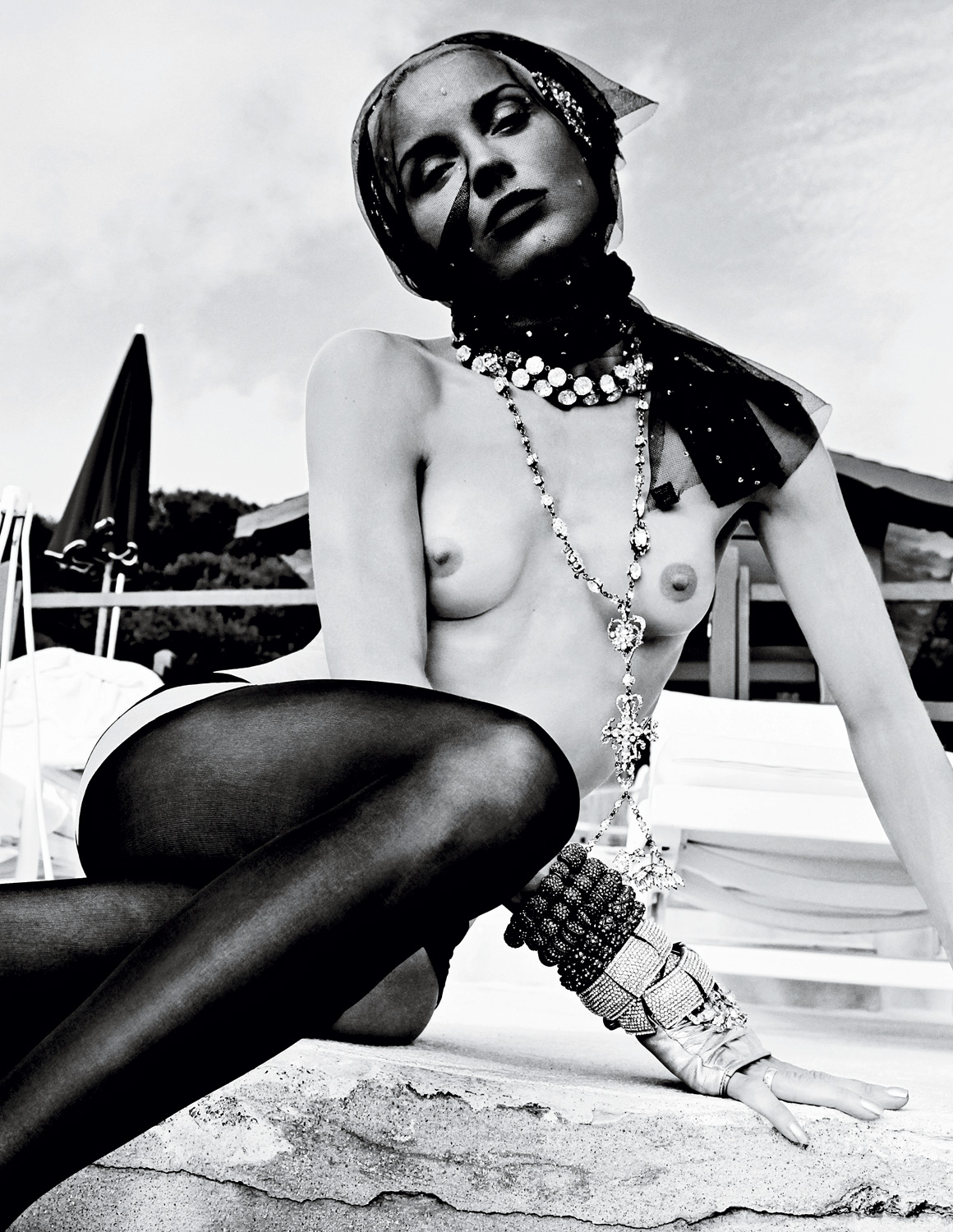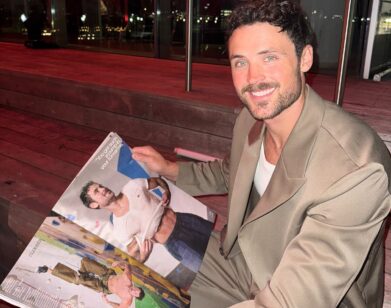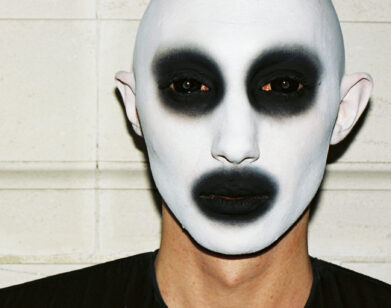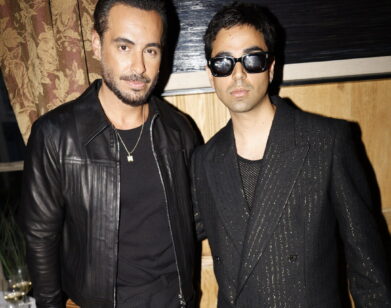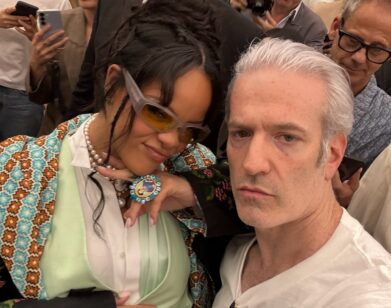Daphne Guinness
I am told that I first met Daphne when I was a child. I cannot elaborate upon this because I have no recollection of the meeting, but I can say the first time that I remember meeting and connecting with Daphne was last year, when she walked in Naomi Campbell’s charity fashion show to benefit the victims of the earthquake in Haiti. Even though I was only 16, we were able to talk late into the night about fashion, history, and art. Daphne is one of those fantastically eclectic people who is knowledgeable about everything from art-deco jewelry to ancient Roman history. She’s a true character, someone who cannot be placed in a single archetype or described in one image. When I was asked to start doing interviews for the magazine, she was the first person on my list simply because I knew the fluid, open dynamics of the conversation would in all likelihood produce something interesting. After all, Daphne isn’t just an heiress of the Guinness family or a muse to photographers like Steven Klein or David LaChapelle—both longtime friends of hers. She’s also tackling her own projects, most notably a 100-piece exhibition of her clothing and personal accessories on view at the Fashion Institute of Technology’s museum, the creation of a diamond-encrusted, armor-inspired glove in collaboration with British jeweler Shaun Leane, and the founding of her own film production company, Mnemosyne. I have never in my life interviewed anyone, and to be honest, I wasn’t sure how our threads of dialogue would translate in print. It’s really too bad that you can’t see our hand gestures, because they would lead you to a greater understanding of us—and I did at one point accidentally knock over a vase in my excitement.
We conducted this interview at Daphne’s apartment, just across from the Metropolitan Museum of Art, in September, on the day after her grand FIT opening.
DAPHNE GUINNESS: I’ve only had one or two people interview me that included my hand gestures in the transcript.
PETER BRANT II: They do that to describe what’s going on in the room at the time to make it interesting.
GUINNESS: I like that. It adds context and dimension. For example, you can’t be ironic in print. Irony doesn’t translate. So the meaning of what you say can be misunderstood.
BRANT II: I know. When I was at the Alexander Wang show, Linda [Evangelista] walked by and I got up to say hi to her and kiss her. We talked for a bit, and someone wrote down what we said to each other and put it in an article in The New York Observer.
GUINNESS: Oh, man!
BRANT II: But they wrote it down wrong. The tone of the article was completely off. They made it sound like I attacked her and then she didn’t answer me! Just because they didn’t hear what she said.
GUINNESS: But you’ve known her forever.
BRANT II: She’s one of my godmothers! And it made it sound like I was badgering her and she was shying away from me. I was very upset.
GUINNESS: I bet you were. I’ve been really upset sometimes when I’ve been misquoted. And it’s the one thing they use in big print. Or it’s taken out of context. Thoughts are fluid and words are sticky. That’s the thing.
BRANT II: That should be a saying right there.
GUINNESS: That’s why I really try to understand what people are saying and answer as honestly as I can. But sometimes it’s like they try to tie you into knots. That’s why I mostly steer clear of the popular press. I try not to read . . . Well, I never read gossip press. I just read books. And I never switch on the TV any more.
BRANT II: What books are you reading right now?
GUINNESS: I am reading Nietzsche at the moment. But I’m always reading many books at a time. It might be quite unorthodox, but what I do is, since I’m always surrounded with books, I’ll read a page of physics, and then I’ll read a chapter of a novel that I really love, and then I’ll say, “Oh well, what does that mixture do in my head?” I adore reference books. I love encyclopedias. I also like just going back to original texts, because a lot of these self-help books today—
BRANT II: They are based on something from the past.
GUINNESS: Yes, they are based on Plato—or on the Old Testament or the New Testament . . . The writings are already there—all people have to do is go to the library and look them up. In fact there is this book you have to read by Roland Barthes [the French theorist]. He died in the ’80s. It’s called Système de la Mode or The Fashion System.
BRANT II: Oh, I haven’t read it.
GUINNESS: You’ll love it. He really breaks it down. He’s very cool, Barthes.
BRANT II: I’ve been reading a book by Thorstein Veblen called The Theory of the Leisure Class, written at the turn of the last century. It’s a fantastic book that I have yet to finish because it’s excruciatingly complicated.
GUINNESS: They are complicated, and sometimes you have to re-read them. My basic mathematics is rather weak, so when some of the theories are broken into equations, I get rather lost.
BRANT II: Sometimes I’ve had to re-read every page like three times before I actually understood what Veblen was saying. But it’s very interesting. It’s about the philosophy and psychology behind class, and everything it’s come to signify in modern society.
GUINNESS: I’ll tell you, I realized quite a long time ago that England and Japan are very similar, having a monarch or an emperor, and that produced in England a class system—but contrary to popular belief, this doesn’t really exist anymore. It started petering out after World War II, really. People love to think that it still exists for various reasons.
BRANT II: It’s kind of just a vanity thing at this point.
GUINNESS: Certain parts of the press use class as an issue more out of reflex. When blame needs to be appropriated, they go for the aristocracy, but the aristocracy really doesn’t have any real power. But it’s a very touchy subject . . . Take fashion. Fashion is not just about trends. It’s about political history. You can trace it from the ancient Romans to probably until the ’80s, and you can see defining moments that were due either to revolutions or changes in politics. At the end of the Roman era, there was this whole move against togas, because that was the signifier of the Roman Empire. In the same way, the ’60s were a reaction against the ’50s and so on. But now we’ve been feeding on a sort of cadaver. At the moment, we’re just endlessly recycling the past.
BRANT II: It’s interesting how a certain period of time has to pass before something becomes fashionable again. In this book, On Human Finery, which I’ve also been reading, the author did a study where he asked students in the ’70s what they thought of fashion in the ’60s. They thought it was the most horrible thing in the world. In the ’80s he asked the exact same thing to his students, and they thought the pictures of ’60s fashion were retro and the coolest thing in the world. A certain time has to pass in order for something to be considered retro, and that’s when it is deemed historical.
GUINNESS: How do you think the last 10 years will be defined? I can’t think of how.
BRANT II: I can’t think of anything either. It’s hard to imagine. What are they going to call this period, this time in society?
GUINNESS: Corporate.
BRANT II: The Age of Advancement.
GUINNESS: Corporations.
BRANT II: The Age of the Consumer?
GUINNESS: There hasn’t been anything real since grunge. That was the last movement led by music or an art form.
BRANT II: Everything has been accepted as beautiful at some point. But it’s interesting about the psychology of style, that somehow by wearing clothes that are not considered fashionable we somehow make ourselves ugly.
I don’t know if I’m a muse or not. That’s not me being coy—muse is a lovely term . . . but I’ve never felt I’m a muse. Daphne Guinness
GUINNESS: When I was at school, I would go to a place called Kensington Market and get as many items as possible to wear for school. I was always a kind of outsider. I didn’t want to be part of only one club. I guess I always identified with those who were slightly a little more—
BRANT II: Eccentric?
GUINNESS: Eccentric is a difficult word because it’s come to mean crazy. Avant-garde would be better. Eccentric is not “centric” in terms of having a center. Because sometimes it’s used in a derogatory context.
BRANT II: I embrace eccentricity. I think it’s the most fantastic thing in the world.
GUINNESS: Yes, in the true sense of the word, but not in the way that people think that you’re a lunatic. Tell me about the book The Theory of the Leisure Class.
BRANT II: It’s a socioeconomic theory dealing with the wealthy class of society. It’s based around the idea of conspicuous leisure, which is the idea that when people have money, they live in a public way that displays their money on purpose.
GUINNESS: Like in Versailles.
BRANT II: Exactly. But not only that. It’s all about class distinction—almost in the way that heels are conspicuous leisure because they show that you’re not working. You’re unable to perform work in them.
GUINNESS: I wear heels like sneakers. I feel weird in flats. Bare feet, fine . . .
BRANT II: In flats you feel shaky.
GUINNESS: It’s because I’ve got high arches and I’m a gymnast. I suppose it’s the way one’s body is built. And everybody’s body is built differently.
BRANT II: According to Veblen, conspicuous consumption would be like when someone wears as many diamonds as they can—just the largest amount of disposable income you can wear on your body at one time. There’s a point where it goes from being elegant to becoming grotesque.
GUINNESS: It does. But it also depends on how the diamonds are set. Because if you wear a lot of diamonds and they’re set really, really well, or if you mix them up, then that’s fine.
BRANT II: When did you start working with David LaChapelle? Because I know you’ve worked with him as a collaborator as well as a subject for some time now.
GUINNESS: David was working with Issie [Isabella Blow] in 2003, and she would drag me along to help, and suddenly I’d end up working on the shoot because Issie would be off doing something else. She was great at the big picture, but she’d be off having tea or lunch with someone and David would say, “Where is she?” So I’d overcompensate. We did this series where we had this pop-up box and were going backstage at all of the couture shows. We’d barge our way in and try to get the models to stay after the show. Your mom was actually the best because she was a really good sport. Some of the models were nincompoops and didn’t know David was such a great photographer and didn’t want to stay. David always made these props. He always needs a context. He would think these things through very carefully, and the models could never understand why they were being asked to hold certain things like a FedEx package or a newspaper. Issie was working for Tatler at this point, which had a very tiny budget, so David and the rest of us were basically doing it for free. David recently found those pictures in his archive and gave them to me as a birthday present.
BRANT II: When is your birthday?
GUINNESS: It was last November.
BRANT II: That means it’s coming up again. Are you doing a party?
GUINNESS: No. I’m not very good at celebrating myself. That’s why I felt very uncomfortable last night. It felt weird to have pictures of myself all over the room.
BRANT II: What do you think about politics right now?
GUINNESS: I think it’s a very odd time in politics. It should be mostly about good governing. We need a government, not politics. Because there’s too much politics. Of course there should be debate. But there seems to be so much pettiness and not enough good faith. It is civilized to agree to disagree and this idea is slowly disintegrating. The great statesmen of the past knew this, and I think it helps drive civilization.
BRANT II: I feel like sometimes these politicians are more interested in a popularity contest. They go around and they try to prove how inexperienced they are, because they’re just like you.
GUINNESS: Yes, exactly. That is precisely what I don’t want. I want someone who is great at running a country.
BRANT II: You want someone who is better than you!
GUINNESS: From perhaps Watergate to Monica Lewinsky, the presidency has been demystified.
BRANT II: People stopped trusting the president. Before that, he was just untouchable . . . Do you remember earlier this year there was a scandal, because Michelle Obama, at a reception at the White House, wore a dress that was by Sarah Burton for Alexander McQueen, and American designers were very upset because it was a dress by a British design house and not an American design house, and she wore it to a state function?
GUINNESS: But what about Jackie Kennedy?
BRANT II: Exactly. That’s what I said. All she wore at first were French designers. It’s also part of that whole demystification of the presidential office—that they can’t get away with as much because people don’t trust their government any more.
GUINNESS: Guess what? The Alexander McQueen show cleared millions for the Met. That’s great for New York, actually. I mean, let’s face it, that did something for New York City.
BRANT II: What do you think of Kate Middleton’s style?
GUINNESS: I haven’t really figured that out. I mean, I haven’t really seen enough pictures of her, but I liked the wedding dress. I thought it was beautiful and simple. And I thought Sarah [Burton] did a fantastic job.
BRANT II: Very similar to Princess Grace’s.
GUINNESS: Sarah was under such pressure. I remember I was trying to get hold of her during the run-up to that, because I hadn’t been following the whole royal wedding. Then when I saw Sarah here, she said, “I wasn’t allowed to say anything, because it was, like, top secret.” Technically, she could have been tried for treason. Of course, she wouldn’t have been. But she said, “If I’d spoken to you, I wouldn’t have been able to stop myself from telling you.” But Kate Middleton? From what I’ve seen, she keeps it simple, and she’s very pretty. I think she sort of gets it right most of the time. But I haven’t seen enough of her really.
BRANT II: A lot of celebrities nowadays trust in a stylist to do all of their clothing choices. They all end up having the same stylist, so they all end up looking the same.
GUINNESS: It’s really bad. That’s what happened in the ’90s.
BRANT II: I want to know your opinion on that. In Hollywood, fashion isn’t going anywhere, because a small group of stylists are controlling what everybody wears—and they’re also getting paid by designers.
GUINNESS: Guess what? Stylists are getting paid by the celebrity and the designer.
BRANT II: When someone decides to wear a dress by a French design house that’s innovative and beautiful and elegant, they’re criticized in the press because it’s different from what everyone else is wearing. I have friends who do lots of red carpets, go to the Golden Globes and things, and they say that they’re afraid to wear something different because they’re worried they’ll end up on a “Worst-Dressed” list or something.
GUINNESS: Listen, I’m always on a worst-dressed list—and I really don’t give a shit. You can’t. I think they shouldn’t be afraid. They should just take the bull by the horns. Frankly, if you feel like going in jeans and a T-shirt, do that. Elizabeth Taylor never had a stylist . . . Okay, some of the older stars were styled by the studio system in the ’50s and ’40s and whatever. But Audrey Hepburn had a great deal of say in what she wore!
EverybodY’s got to wear clothes. Otherwise we’d be naked, probably in breach of the law—and probably cold. Daphne Guinness
BRANT II: It’s all about setting yourself apart from everyone else.
GUINNESS: Then you have your own look.
BRANT II: Exactly. You want to have your own look. You don’t want to have everyone else’s look. It’s because there’s all these young starlets, and they’re told that their style, that their opinion is wrong, and that they have to follow what someone else says if they want to be successful.
GUINNESS: It’s pathetic, actually. What’s so awful is that when you see them on the red carpet, and then you see shots of them in day-to-day life, it’s such a difference. It’s insane. You just think, Well, that person is not inhabiting their look. The thing about clothes is that it is a fact that everybody’s got to wear clothes. Otherwise we’d be naked, probably in breach of the law and probably cold. So you might as well wear what you want, inhabit what you want, whatever your budget is, and not be dictated to by other people. It doesn’t invalidate you as a human being to be dressed in which ever way you see fit. Frankly, look at the tribal systems in Africa or in Papua New Guinea. That’s what human beings do. They differentiate themselves tribally by that sort of thing.
BRANT II: There’s a story in the book I was talking about about a tribe in turn-of-the-century Africa where the women would wear these blue beads, and all the highest women in the tribe wore these beads because they were very expensive and rare, and they only came in once every two years from the Middle East through traders. All the head tribesmen would buy them for their wives. It was a status symbol. Then when trains started coming to that area, and they started bringing barrels filled with these beads because they were in high demand . . . Suddenly all of the most important women in the tribe refused to wear them because everyone else had them.
GUINNESS: I grew up in a chapel in Spain. I was looking for skulls all the time—I’ve always loved skulls. I was making all these skull bracelets. Then, suddenly, everyone was wearing skulls and crosses and I thought, “Eww, I don’t want to wear skulls anymore.”
BRANT II: Let’s talk about the glove you had made with Shaun Leane.
GUINNESS: I’ve got it here, actually. It’s a sculpture rather than anything else. And then I set some of my diamonds into it.
BRANT II: I saw a necklace that he did for Boucheron with a button that makes the flowers open. It was so beautiful.
GUINNESS: This is a sculpture. It was conceived as such that you should put in a bell jar. This is a piece of art. It was made because Alexander [McQueen], Shaun [Leane], and I, one night, were at a party, huddled in the corner, and I was thinking, “I just want to be protected anonymously where I don’t have to see anyone.” They are just too terrifying, these events. The germination of the glove sparked there, and that’s when we started making it.
BRANT II: It’s armor?
GUINNESS: It’s against the world. I am just going to armor myself up to the teeth until no one can get me.
BRANT II: It’s so fantastic.
GUINNESS: It’s a real collaboration between me and him. Blimey, it took a long time to make!
BRANT II: Are you excited for the Elizabeth Taylor jewelry sale?
GUINNESS: You know, I met her with Philip Treacy. I’m so sad that it’s all going to be broken up. Philip kidnapped me off a shoot. I was in the middle of a shoot with him, and Elizabeth Taylor’s assistant called up. We were in a studio in west London, and he went, “Elizabeth Taylor’s assistant just called now saying that she wanted a hat.” Then she called up again, like, half an hour later. So what we did was just wrapped up the shoot, and they shoved me in the back of the car, because I had this hat on with all these diamonds. We couldn’t take the diamonds off because of the insurance, and he was shooting me with these kind of brooches and what have you. So they couldn’t leave me behind . . .
BRANT II: Because you had them on.
GUINNESS: We get to the Dorchester. I’m standing in the corridor, sort of hovering because I’m too embarrassed to go in . . . She said, “Who’s that person outside? Come in, my child,” that sort of thing, and I was really shy . . . But she brought out all her jewelry and she started showing everything. Philip is such an artist and he’s so generous. He gave her like 60 hats. He gave them from his heart. She was like, “Which one do you think I should buy?” He was like, “You can just have all of them.” Then she started talking to me, and I couldn’t think of what to ask her. I was sort of slightly tongue-tied.
BRANT II: I’d really love to have met her.
GUINNESS: She was in a wheelchair, and she wasn’t very well. But she had such allure, such beauty. She looked amazing, she really did. She had this really lovely aura about her. I just thought of one question that I really wanted to ask, which was: “Was costume part of the narrative in your films?” She said, “Such a good question. Absolutely. I knew what lines I had to speak. I had some of the lines sewn in the back of the clothing, and so did the person I was speaking to.” The costume, plus the script, plus the director . . . I mean, everybody worked in unison . . .
BRANT II: The big picture houses still use all the old costumes that they used before in period films.
GUINNESS: As we were both saying before, you can delineate history by costume. And we’re the only creatures on earth that can clothe ourselves.
BRANT II: It’s the most public form of self-expression that’s always with you. It’s just a way of taking what’s inside and putting it out there for everyone else to see.
GUINNESS: It’s an emotional thing, you know. It’s like Issie. It was very much her art form. It was because she loved it, and because that was just the way she felt inside. But she always wanted to cover her face, because she didn’t like the way her eyes . . . She had beautiful eyes, but she didn’t like the way her eyes looked, so she liked to have her eyes covered.
BRANT II: Getting back to fashion, I wanted to ask you . . . A lot of people are saying that haute couture is dying . . .
GUINNESS: It is.
BRANT II: It’s stopped becoming clothing made for people to wear, and started becoming just kind of an advertisement for the brand. It’s really a kind of dying art form, in a way.
GUINNESS: People didn’t know the difference between prêt-à-porter and couture for ages, because there wasn’t the Internet, they weren’t online. You’d have the show, and then you’d read the Herald Tribune the next day about it, and that’s it. The popular newspapers wouldn’t run the couture shows at all, so it was very underground. Sometimes, people would see a Chanel jacket that would be a couture jacket, but they wouldn’t understand why it wasn’t in the stores. Then it died because they didn’t have the clients and the manpower to do it. And once you sort of start losing all those artisans that knew how to make those things, it’s like cutting down a forest. It’s not going to grow back. They stopped making things in France. They stopped making the lace. Thank god Chanel bought Lesage and the beading . . . The reason it’s dying is because of the rise of the machine, and people outsourcing to China . . .
BRANT II: I think also the Internet has something to do with it, and the way that images make their way around the world within seconds of being shown to the public.
GUINNESS: That’s why Tom Ford was very clever not to show online. Just have the pictures come out when the things are ready . . . If you show it online, it’s ripped off.
BRANT II: How do you feel about what’s happened to John Galliano?
GUINNESS: Well, I think what he said was absolutely awful. That is inexcusable. But he’s not like that when he’s sober. It’s not an excuse. He said it. But he was bullied for exactly those reasons when he was growing up at school. I think he was terribly unhappy. Terribly unhappy . . .
BRANT II: Well, he was designing like 17 collections every year . . .
GUINNESS: Yes! You can’t do that. Look what happened to Alexander [McQueen]. He ended up hanging himself. You just can’t put people under that sort of pressure. But it doesn’t excuse what he said. But you know what? He’s the most gentle person when you meet him normally. I’ve never seen him like that . . . Racism is the worst.
BRANT II: A lot of people refer to you as a muse. How do you feel about being called that?
GUINNESS: I don’t know if I’m a muse or not. That’s not me being coy—muse is a lovely term. It’s a great compliment. But I’ve never felt I’m a muse. I just kind of do my own thing.
BRANT II: I was told recently that you are an opera singer.
GUINNESS: Yeah. [laughs]
BRANT II: I didn’t know that. Tell me about that.
GUINNESS: Well, before I got married [to Spyros Niarchos], I was going to go to Guildhall and study classical music, and then to train as a singer. Well, love, I had three children instead, so I didn’t pursue that. But actually, funny enough, I started again the other day.
BRANT II: I’m told you’re very, very talented.
GUINNESS: Well, I’ll tell you what it is. I have relative pitch, so I can learn by ear very easily. But it’s un-useful in that, when it comes to kind of writing music technically, I will do it all by ear. So I’ll be very sloppy about the actual music. Maybe I’ll miss out a quaver or a semi-breathe or something in it, because I’ve already learned it like that. It’s a curse and a blessing, because it means that sometimes I’m not as rigorous with the music itself as I should be because I learned it by rote. I used to do that with the piano, too.
BRANT II: I’m musically challenged. I love music, but I can’t play . . . When I was little, I wanted to be a child prodigy, but I was awful at the piano.
GUINNESS: I had an accident with my right hand, so I stopped playing. It had to do with a lawn mower. Can you imagine? I’ve still got scars. I’m almost ambidextrous as well. So I’ve always had this kind of left hand-right hand problem anyway, but my writing on this hand is almost calligraphical now. I don’t know why, because I didn’t ever learn it. My hands kind of work separately. But singing was always very, very, very easy for me. I know in the last few months it doesn’t look like I’m afraid of putting myself out there, but I also have terrible nerves. I don’t think I’m going to be performing any time soon, but I might join a choir.
BRANT II: Really?
GUINNESS: Yeah. It would be kind of fun. I always wanted to join the choir up in Harlem. They really know how to sing! That’s really great. I like certain operas. I’m not very keen on Puccini. If I have to see another La Bohème, I’m going to shoot myself. I mean, really. There are certain ones I love like the Ring [cycle], and I love Tristan und Isolde. I love Parsifal. I love Il Trovatore. I love all the Mozart operas. The Magic Flute bothers me because I just don’t like it when there’s no recitative. They start talking in the middle. I don’t like musicals for the same reason. Because when someone suddenly bursts into song in the middle of a sentence, you just think, That’s weird. But I like it when the whole thing is sung.
BRANT II: I love The Marriage of Figaro.
GUINNESS: I can sing that from beginning to end And the Overture . . .
BRANT II: When I was little, I used to love the ballet. I thought it was so fantastic. I loved the costumes and everything.
GUINNESS: I love the costumes. But do you know what always bothered me? The sound of the thumping on the floor, where you hear their feet. And I didn’t understand why there was no singing.
BRANT II: Is there anything you’re obsessed with right now?
GUINNESS: I’m obsessed by the Large Hadron Collider. I don’t know why, but I’m normally obsessed by the same things, like French movies. I like to see the films of Jean-Luc Godard. I’m obsessed by the new [Alan] Hollinghurst book, which is incredible, and the latest Edward St. Aubyn book, called At Last. That’s a really good one. What else . . . Gosh. Stoic philosophy. Seneca.
BRANT II: I love Seneca. I always give a quote that’s very interesting and very funny. “Finding wealth an intolerable burden is the mark of an unstable mind.”
GUINNESS: I’m not completely a Stoic, because I think you have to have a healthy dose of something else. You don’t want to be a complete Stoic. But I think they’re actually marvelous. The ones who are really fascinating—but severe—are the ones who came before them. The Cynics. The Cynics believed that you shouldn’t have anything at all, so they just lived from hand to mouth. They would give their discourses. They wouldn’t have a home. They would eat if they were given food. Really austere. Can you imagine? Cynical means such a different thing now. And I’m obsessed with Roman Emperors—Trajan, Hadrian, Marcus Aurelius . . . I’m actually also obsessed by Nero and Caligula because they were so awful. But Roman history is fascinating especially in light of what’s going on right now. It’s funny, because what people forget is that—
BRANT II: History repeats itself?
GUINNESS: Yes.
BRANT II: Well, you can’t know where you’re going unless you look back.
GUINNESS: Precisely. You need to know where you’ve come from . . .
BRANT II: Are there any clothes you’re obsessed with right now?
GUINNESS: I am obsessed by uniforms. And Chinese robes. I’m always obsessed by Chinese robes. I’ll wear them with this huge pair of platforms and an old swimsuit. And I’m completely obsessed with new technologies for making clothes. I like that science is being applied to clothes and will change what we wear.
BRANT II: Like, technologies for weaving intricate silks and things like that?
GUINNESS: Yes, but other extraordinary inventions, too. Like I’ve heard about a jacket where, if you hit the ground, a helmet comes up as protection. It’s cross-disciplining—taking something from the car industry and bringing it into fashion. Lee [Alexander McQueen] was heading in that direction. I mean, he really was.
BRANT II: I know you travel a lot. Where do you usually go for Christmas?
GUINNESS: Jesus, I’ve had some very strange Christmases lately. It used to be in St. Moritz every year.
BRANT II: I was in St. Moritz for Christmas this year. In fact, I was in St. Moritz three times this past year. I don’t know why. I just kept going back for some reason.
GUINNESS: Well, I lived there for like 13 years. That’s where I lived with Spyros [Niarchos] and the kids. I kind of miss that peace and quiet now. I don’t like it when it gets terribly social, because it’s just like that pressure to have to go to things. And I’m not very good at that. Sometimes I find social life very exhausting. I haven’t had a real vacation in five years. Like, more than sort of five or six days. It’s just, like, I need a real good month in India or something like that. Just go and do some yoga on the top of a mountain. Take me to a wigwam.
Peter Brant II is a student and New York–based contributor.

